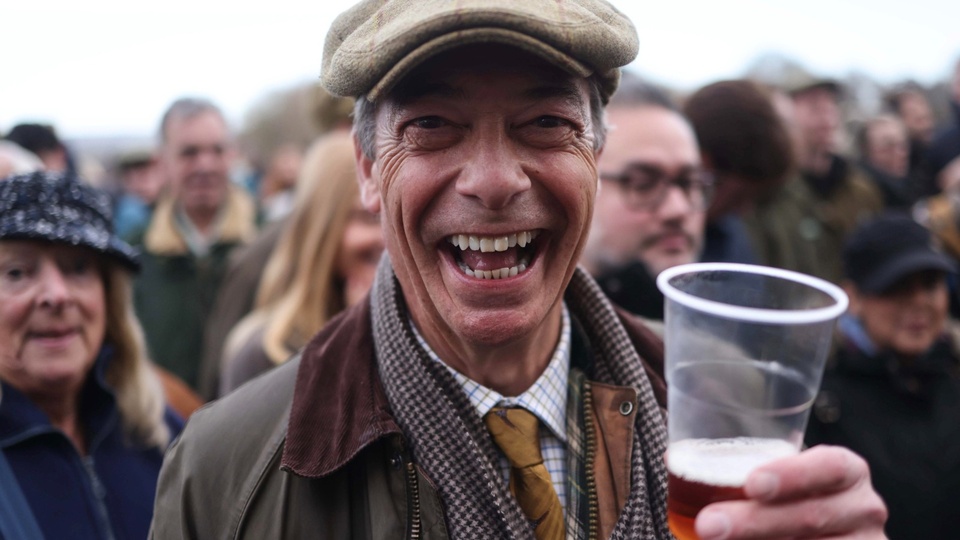From London
TO Sunak a new front emerged political battle on the right side of the increasingly extreme conservative right. The protagonist is Nigel Farage, a key figure in Brexit, Britain’s exit from the European Union. Farage’s tactics are the same as those he employed on David Cameron 17 years ago: distance himself from the Conservative Party leadership, adopt the most recalcitrant policies of the party’s base, and appeal to disillusioned conservatives.
This tactic came into play between 2006 and 2016 when Prime Minister Cameron was forced to hold a referendum on the European Union, a referendum which, to the surprise of the world and even pro-Brexit, ended in victory. Britain outside the European bloc. In those years, Farage led the British Independence Party, which has gone from marginal positions (0.03% in the 1997 election) to winning municipal elections and becoming Britain’s main political force in the 2014 European parliamentary elections. Farage’s current party, British Reform, appears to be moving along the same path. Born from the remnants of Brexit, they currently have a 9% intention to voteenough to further destabilize Rishi Sunak and his re-election project.
Shift to the far right
Farrage has neither the bad taste, nor the collection of outbursts, insults and canine eccentricities that Argentina’s current president has. To our knowledge, he never promoted the free trade of organs or carried weapons in a country that culturally abhorred such practices. Farrage’s popularity is based more on the fact that he epitomizes the friendly pub hustler who, while holding a pint of beer in hand, expresses categorical opinions on immigration, security and supports short-sighted nationalism based not on its economic policies but on the uniqueness and natural advantages that set Britain apart from other countries.
From an average of all this year’s election polls just published by the head of the British pollster, Sir John Curtice, a phenomenon similar to what is happening in other countries, from Spain to Argentina, is evident: an electoral shift of right-wing voters to a more extreme position. “A possible explanation for the new challenge presented by Farrage and his English Reformation was the question of immigration. Dissatisfaction with the economy and the National Health Service also weighed. Reform Britain may be a haven for Conservative voters who feel Labor is too far from them. “This is also a problem for the Labor Party, which needs to win some of the conservative vote to gain a majority in parliament at next year’s election,” Curtice wrote in his letter. Independent.
Elections are just around the corner
In the British parliamentary system, the government can call an early general election at any time. The most likely dates are April – after the presentation of the tax reduction budget in March – or October. The Labor Party now has a 16% lead over the Conservative Party. According to Curtice, this difference is due to the fact that Sunak has not succeeded in eliminating the discredit that befell his two predecessors.
Boris Johnsonwho won the election in December 2019, had to resign in the middle of his term of office and is still involved in the investigative scandal carried out by “Party Door” (more than 100 parties held during the pandemic at government headquarters at 10 Downing Street). Her successor in office, Liz “the brief” Truss, lasted just seven weeks and nearly succeeded in upending the economy with a neoliberal revolution entitled “Britain Unchained” with a very similar flavor to Javier Milei’s libertarian message.
Conservatives are divided into five “tribes” that are most likely to accuse another tribe of the greatest treason. On the extreme right of the Party is former two-time Interior Minister Suella Braverman, who last month said wonderful things like that those who live on the streets do so by personal choice. Braverman is fighting with other tribes of the same ideological color for the chance to become the next leader in the event of an electoral defeat that almost everyone predicts will happen to the prime minister.
In this tribal collage moderate Tories are becoming fewer and fewer, but they still have the parliamentary power to deliver a particularly harsh political blow to Sunak in a vote on asylum laws that must be implemented in early January, one of the prime minister’s five promises to voters. In the event of defeat at the polls, the Labor Party demanded, supported by the rest of the opposition, that an early general election be held as soon as possible. For Sunak, it is about getting through, one way or another, the inhospitable British winter.

“Web specialist. Incurable twitteraholic. Explorer. Organizer. Internet nerd. Avid student.”






